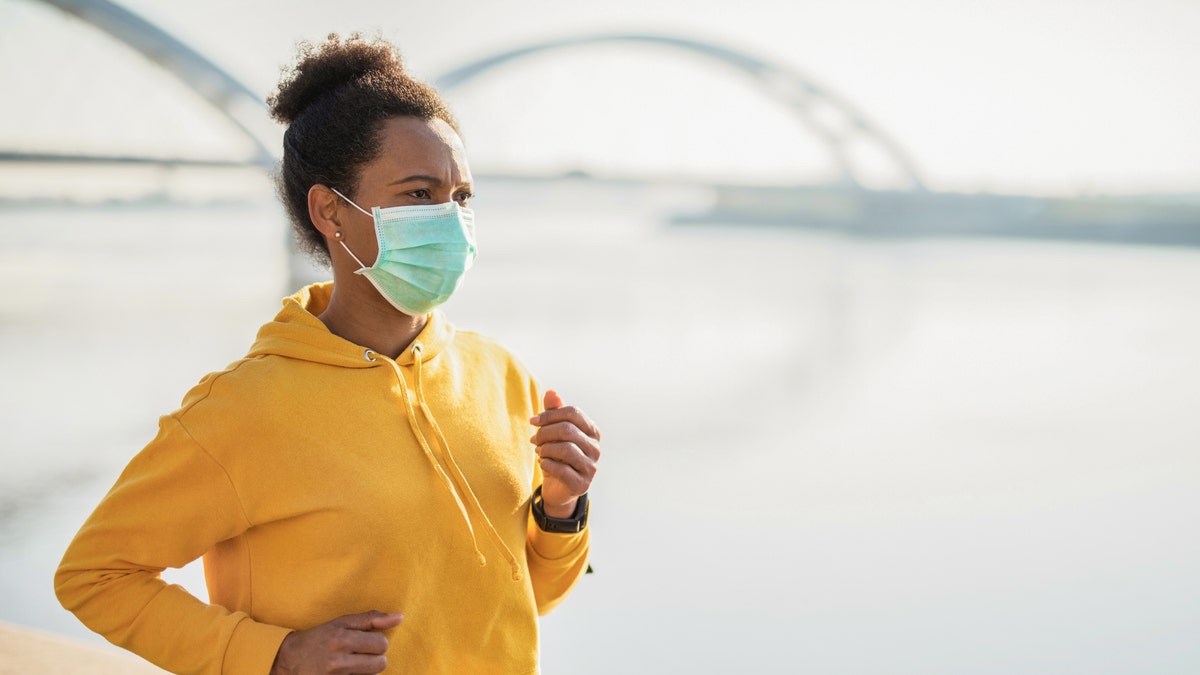Fitness industry leaders urge governors to allow gyms to reopen
Gold's Gym President and CEO Adam Zeitsiff makes the case to reopen gyms on 'CAVUTO Live.'
At the start of the coronavirus epidemic in the U.S., home workouts became increasingly popular as gyms across the country shuttered in an effort to prevent the spread of the deadly virus. One survey even found that some 24 percent of Americans plan to ditch the gym altogether even once the pandemic is considered over, citing safety concerns.
But with gyms gradually reopening in some places, and with fitness fanatics choosing to break a sweat outdoors in states that require face masks in public, some may be wondering: Is it safe to wear a face mask while exercising?
CLICK HERE FOR FULL CORONAVIRUS COVERAGE
The World Health Organization (WHO) actually advises against wearing a face mask while working out, saying that doing so “may reduce the ability to breathe comfortably.”

If you can socially isolate or distance yourself from others while exercising, one expert recommends avoiding wearing a face mask during your workout. (iStock)
“Sweat can make the mask become wet more quickly, which makes it difficult to breathe and promotes the growth of microorganisms. The important preventive measure during exercise is to maintain a physical distance of at least one meter [6 feet] from others,” it states.
Still, at least one popular gym chain, Planet Fitness, announced this week that anyone working out in its gyms will be required to wear a face mask at all times beginning Aug. 1. Company CEO Chris Rondeau said the policy will affect all of the company's 1,450 locations in North America and Australia that are open to the public.
"Gyms are part of the solution and a key element of the health care delivery system, providing much-needed access for people to exercise and stay healthy," he said. "Given our leadership position within the industry, we believe it's our responsibility to further protect our members, employees, and communities so that we can all safely focus on our health, which is more important now than ever before."
To find out more about the health effects of working out in a face mask, Fox News spoke with Jaclyn Fulop, a board-licensed physical therapist with over 10 years of clinical practice in sports medicine and orthopedic rehab and owner of Exchange Physical Therapy Group.
Fox News: Is working out in a face mask generally safe?
Jaclyn Fulop: Working out with a mask is generally safe, especially during low-impact exercises like walking or moderate weightlifting. Stationary exercises are more conducive to working out with a mask versus going for a run, running on a treadmill, or an intense bike ride.
Fox News: What happens to your body when you exercise with a face mask on?
Fulop: When you exercise with a mask on, you are ultimately decreasing the flow of air to your lungs, which can become dangerous if you overdo the workout or don’t take enough breaks. Essentially, you’re inhaling carbon dioxide due to heavy breaths getting trapped in the mask cloth preventing fresh air from getting in.
Fox News: What can people expect when working out with a face mask on?
Fulop: While working out with a mask, people can expect to feel exhaustion quicker than they usually would without a mask. It’s important to listen to the body and if you feel fatigued or any of the previously described symptoms, take a break and slow your heart rate down with deep breaths. While wearing a mask, your body temperature will increase due to the mask trapping in exhaled air which can lead to exhaustion and overheating.
Fox News: Is it possible to adjust to reduced oxygen flow?
Fulop: It is possible for your body to get more accustomed to working out with a face mask on the more you do it, however, it won’t happen overnight. This is something that takes time with a slow, steady increase in exercise over time. It’s important to wear a mask, but you just need to be mindful of your body and listen to it. Everyone’s body is different so some people might not notice a difference, while others might feel more exhausted or lightheaded during their workout. That is why you need to listen to your body and don’t overextend – take things slow if you need to.
Fox News: How do you know if you’re getting enough oxygen?
Fulop: If you’re not getting enough oxygen, you’ll probably start to feel dizzy, lightheaded, and [experience] shortness of breath. These are all signs that you should take it slower or take more breaks in your exercise routine.
Fox News: What types of medical conditions would prevent someone from working out in a face mask altogether?
Fulop: Anyone with an underlying respiratory issue or cardiovascular issue would want to avoid working out in a face mask. Examples of this include, asthma, COPD, cystic fibrosis, and other heart or lung conditions. If possible, these people should only participate in indoor workouts in the comfort of their home or outside in total isolation to avoid contact with anyone else given our current circumstances as these groups are also more vulnerable.
Fox News: Can perspiration affect mask safety?
Fulop: If your mask becomes damp, it can be counterproductive and become permeable to particles, so it’s important to find a mask that will keep moisture away.
WASN'T SUMMER SUPPOSED TO KILL THE CORONAVIRUS?
Fox News: Are there certain types of masks to avoid wearing while exercising?
Fulop: An N95 mask is made of very heavy material and filter, so when breathing heavily, this will cause breathing restrictions and you may be rebreathing carbon dioxide if it’s trapped under the mask.
Fox Business's Daniella Genovese contributed to this report.
